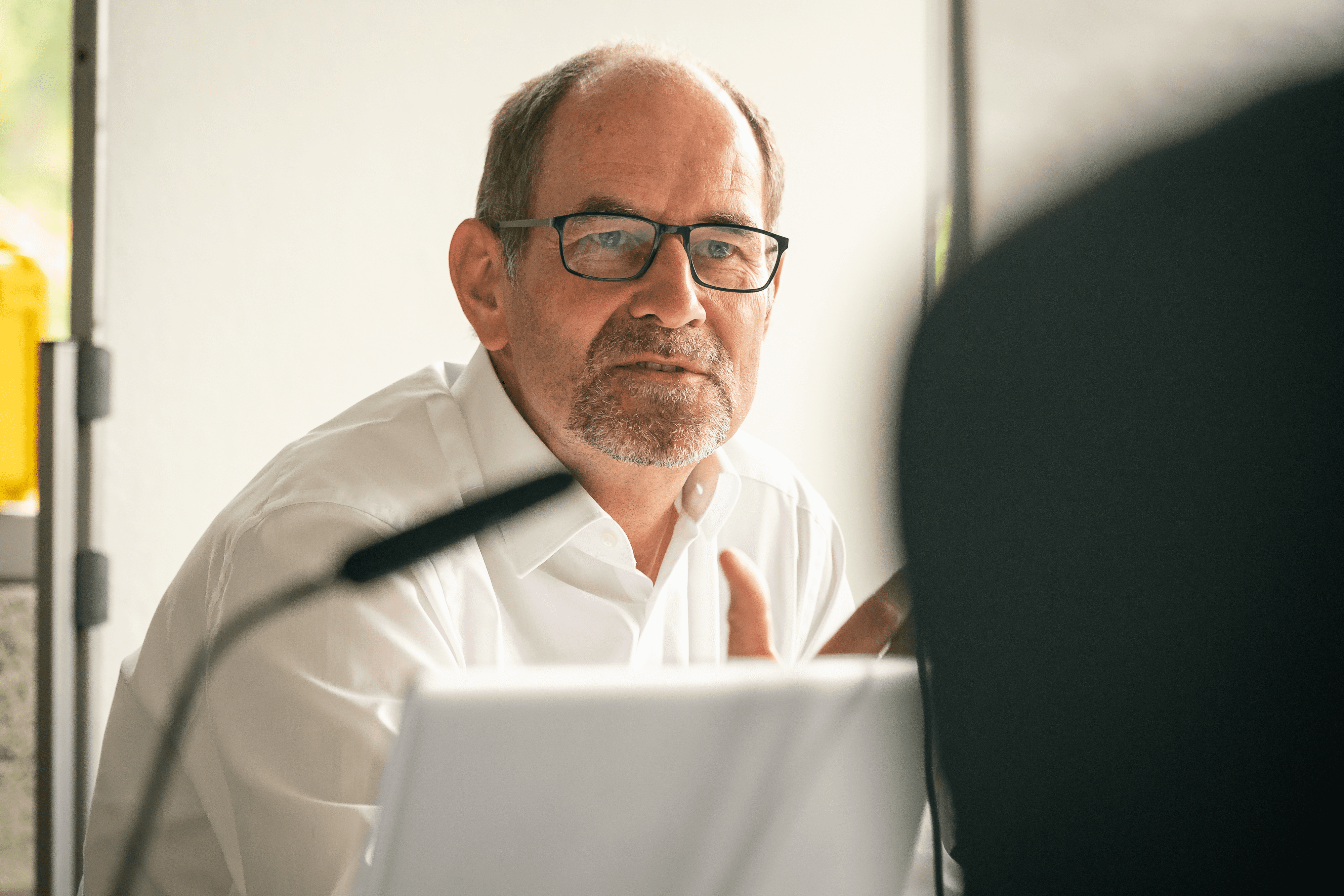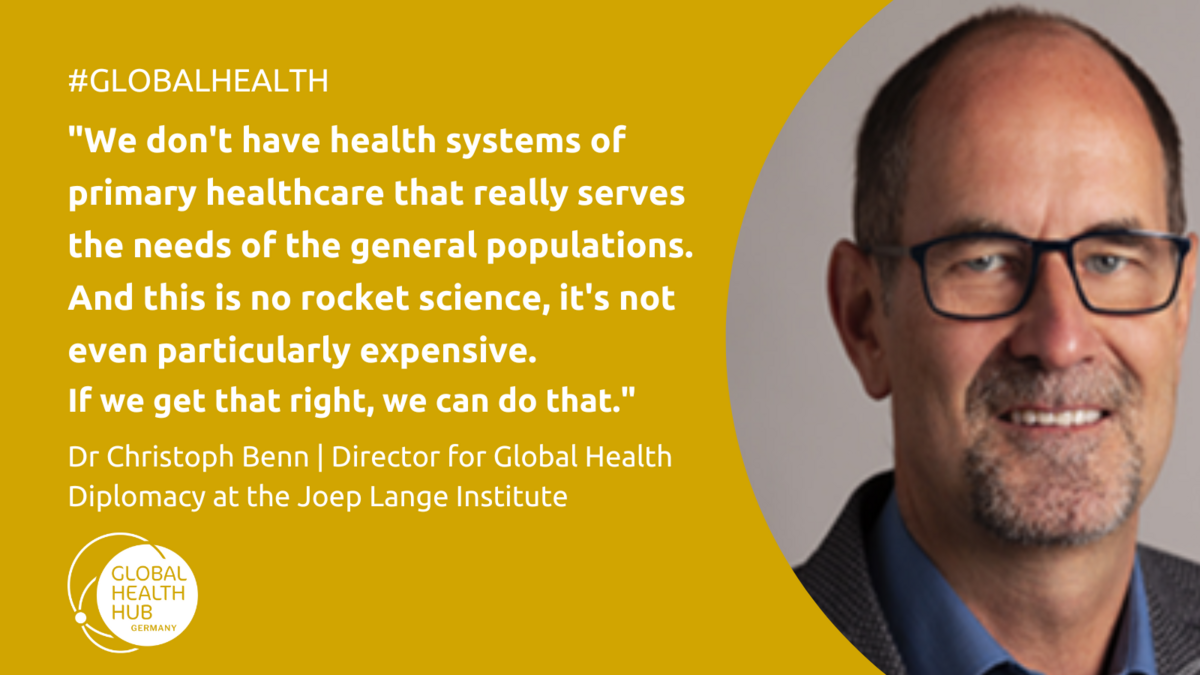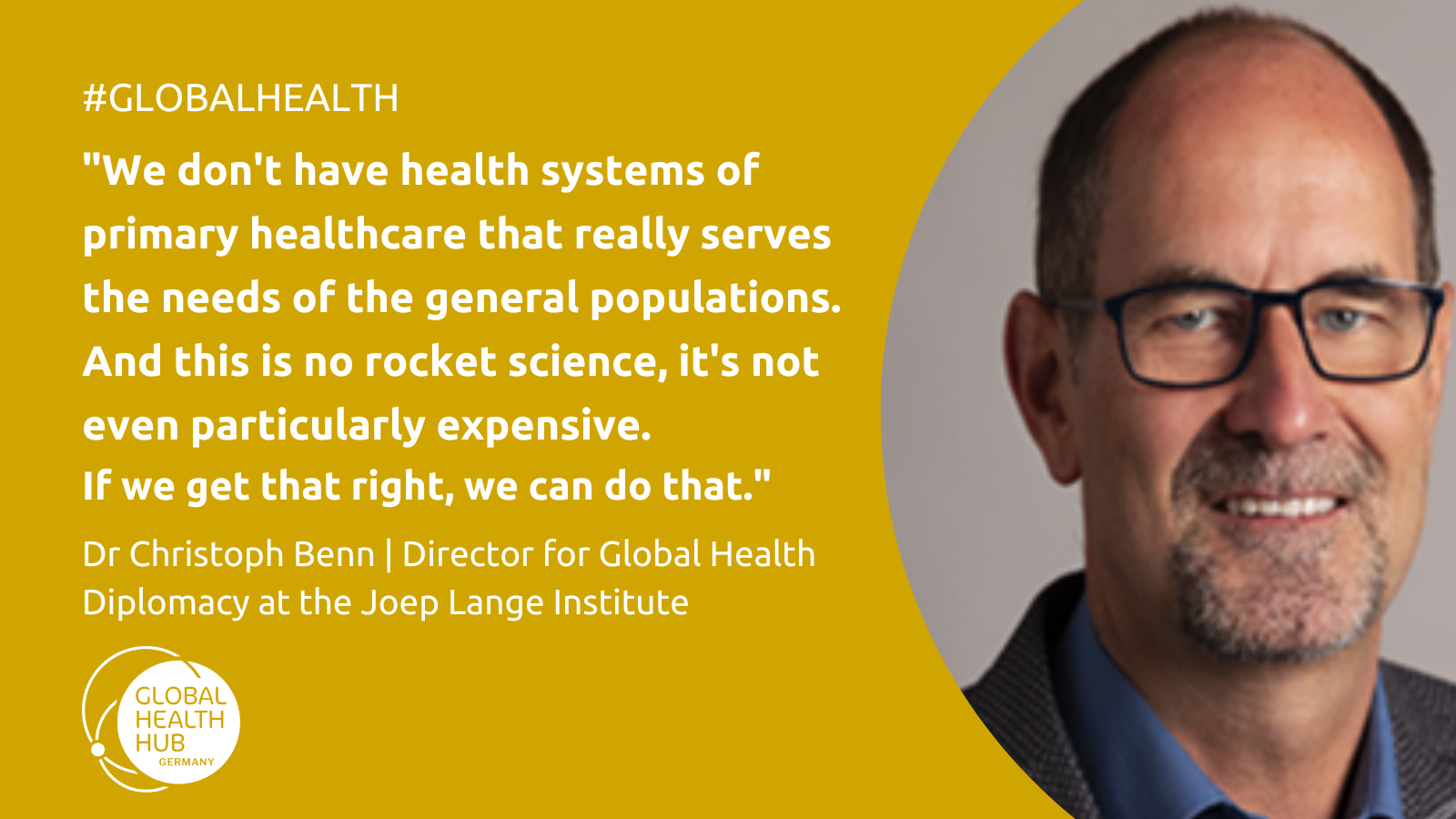Interview with Dr Christoph Benn about his work as co-chair of the Hub steering committee and his vision for Global Health

We interviewed Dr Christoph Benn, co-chair of the Hub steering committee, about his work at the Hub and at the Joep Lange Institute. We talked about the Hub’s role in strengthening Germany’s contribution to Global Health and about his motivation to keep advancing Global Health.
You are Director for Global Health Diplomacy at the Joep Lange Institute. What are your priorities and plans for this year?
Christoph Benn: The Center for Global Health Diplomacy of the Joep Lange Institute in Geneva has two priorities, particularly for this year.
First, the digital transformation of health systems in low- and middle-income countries. We like to call that digitally enabled primary healthcare. This is a very high priority also on the international global health agenda.
And secondly, global health financing. It is the first time since 2014 that none of the big global health institutions is running a replenishment. Last year it was the opposite. The Global Fund, CEPI, the Global Polio Eradication Initiative, the Global Finance Facility and others had their replenishments all in one year, which led to a huge competition. The next big year will be 2025, when the Global Fund, GAVI, World Bank and others will have their replenishments. Post- COVID and the consequences of the war in the Ukraine make replenishments and financing of global health much more challenging and difficult than before. That’s why we want to use this year to look into what has worked well, what can be done better, how can we be better prepared for the challenges of the future?
What role does the Global Health Hub Germany play in strengthening Germany's contribution to Global Health? And what is your role as co-chair of the Hub’s steering committee?
Christoph Benn: I've been involved in the Global Health Hub Germany since its inception in 2019. It has already contributed greatly to positioning Germany better on the global agenda, but also to facilitate much closer collaboration between stakeholders in Germany. I've been working in global health for more than 30 years, and I've often seen how other countries played a leading role, like the UK, like France, but even smaller countries like the Netherlands or Australia. They often had better networks, the civil society was working more closely with the government, there was much closer collaboration. It was those institutions and organisations that were then called to represent at international boards and meetings. Germany, while a very big donor in global health, was always lacking a little bit behind.
The Global Health Hub Germany plays a very important role in strengthening all the different players in Germany from the academic sector, the private sector, civil society, to work together but also provide more visibility. Not just at one or two conferences per year like the World Health Summit, which is obviously very important, but the Global Health Hub Germany provides a more continuous input. There are many events around the year on very different but very interesting topics and that strengthens this community.
For me, as one of the co-chairs of the steering committee, we obviously want to facilitate that, to strengthen the network, to put very interesting topics on the agenda and overall, to improve the exchange between these different stakeholders.
The Hub has 12 Hub Communities on various global health issues. How can these Hub Communities be even more relevant in driving innovation, cooperation and sharing expert advice in their various topics?
Christoph Benn: The Hub Communities are very important because they often address topics that are not so high on the national or international agenda. When we had the Community Day at the Global Health Talk Berlin last year, I had the chance to attend several of the presentations and dialogues of these communities of practice and they were fascinating. It's impressive how many people are engaged in these communities, addressing very important topics like, for example, mental health, women's health, urban health or animal health. You find experts on all of these topics in Germany, but you normally don't hear their voices so much. To turn that into policy papers that decision makers can read and study in Parliament, in government, is a very important contribution. We want to strengthen that over the next few years so that we can address more of these topics and invite other experts in Germany to contribute to Hub Communities.
Why did the steering committee choose the two topics "Global Health Financing" and "Digital Transformation for Better Health" as key topics to be discussed in the 2023 Catalyst Dialogues of the Global Health Hub Germany?
Christoph Benn: We do believe that these two topics are key topics on the global agenda this year. As indicated, I think all global health institutions or governments in donor countries, also in implementing countries, are really thinking hard how we can make this work in the future. What we see is that the resources are more or less flatlined. Development assistance for health has not been growing and following the COVID pandemic and the consequences of the war in the Ukraine, there's a lot of pressure on budgets in all countries. At the same time, the demands are increasing. There are only seven years left to achieve Universal Health Coverage, to achieve the Sustainable Development Goals in health by 2030 and we are falling more and more behind. We do need to think about new approaches to health financing and that's what we are doing in one of the two Catalyst Dialogues.
The other catalyst dialogue is about digital health, the digital transformation of health systems. That was already on the agenda of the G20 last year at the Indonesian Presidency, but it will be even more present on the agenda under the Indian G20 Presidency this year. It's one of their top priorities for this year and is something that is very much discussed internationally at all conferences. It's also a big topic for the World Health Organization that has its division on digital health and innovation and with which we work very closely on this.
In addition to your role as co-chair of the Hub’s steering committee you are also chair of the board of I-DAIR and involved in other processes at G20 and UN level. Where do you see the interrelation of these different institutions and work streams?
Christoph Benn: I-DAIR is one of the recognised international organisations by the G20 Presidency and I had the privilege of attending the 1st G20 health experts meeting hosted by India in January. Digital health is one of the key priority areas for the G20 Presidency and they are going to launch a new G20 digital health initiative. I-DAIR is participating very actively in that and advising the Indian government on some of these aspects. What kind of architecture is required so that we can really advance this agenda most effectively? How can countries with resource constraints in the Global South really invest in and utilise the opportunities of digital health and the digital transformation of health systems? That's something we are discussing in these G20 health experts meetings. The next meeting will be in April, and we do hope that by then there will be good recommendations for the actual G20 summit that will then be held in September this year.
India is putting digital health and data very high on the G20 agenda. What concrete steps would you like to see India take?
Christoph Benn: There is a huge amount of data and data is driving healthcare. However, these data are very unequally distributed and access to data and ownership of data is not exactly where it is needed most. It is owned by some big companies, by a few major countries and it leaves many people of poorer and smaller countries out completely. They also contribute their data, but they don't even know about that, they don't know who's using their data. To make sure that this is going to change, we need a new governance of digital data in health and in other sectors. Getting the governance and the ownership of data and the use of data for the benefit of people right is a top priority.
Furthermore, the investments are very unequally distributed. There are huge investments of billions of dollars by a few companies, in a few countries, but there is almost nothing available in many other countries. How can that be supported so that all countries participate in that? This is a very, very fast-moving development. Digital health, artificial intelligence in health is racing ahead. It is our challenge as a global community and with Germany playing a key role in here to make sure that everybody will benefit from that, to leave no one behind, as we say in the Sustainable Development Goals. This is one of the major tasks that we hope the Indian G20 Presidency will contribute to.
Will you be attending one or more UN High-Level Meetings on health this year? What potential do you see in these meetings and what outcome do you expect?
Christoph Benn: I will probably attend a couple of UN High-Level Meetings. It's a very busy year on the agenda of the UN. There will be a UN High-Level Meeting on Tuberculosis, there will be the review of the Sustainable Development Goals this year, but then we are already focusing on 2024 where there will be a new conference on financing for development and the Summit of the Future, hosted by the UN Secretary General. These will be very important events in 2024. But the preparation for such events always happens the year before. There will be many prep meetings and consultations in 2023. And again, if we get that right, these events can be quite critical for the remaining years of achieving the SDG's, of making sure that all these opportunities are used really in the interest of the people. We are looking forward to that and to working closely both with the UN Secretary General’s office and in the health sector, in particular with the WHO.

On a personal note, you are active in health since several decades, what is it that keeps you going? What is your personal motivation and vision for global health that might also inspire others?
Christoph Benn: I started to work in global health when I worked as a clinician in a hospital in Tanzania 1988-1992. Later on, I did my studies in public health and worked for many years in public health. Building on this, I contributed to the creation of the Global Fund to Fight AIDS, Tuberculosis and Malarial, and worked for 16 years as one of the directors combining public health, with health financing and global public health policy.
What has motivated me was really my earliest experience in Tanzania, working with people on the ground. It was just at the beginning of the devastating HIV epidemic at that time in that region of the world. I saw so many young people dying from this disease. I saw that also many, many children were dying from preventable and treatable diseases such as malaria, simply because they had no bed nets to sleep under. Sometimes we had not the simplest drugs to treat these people. And that's what motivated me to go into public health and global health because I really wanted to do something that would change those circumstances, that we could use the drugs, the diagnostics, the tools, the preventive approaches that we had in richer countries also in the poorer countries of the world. That motivated me to advocate for the Global Fund and work there for many years so that we could mobilise those resources for people who had been less privileged.
Now I am leading my Institute for Global Health Diplomacy in Geneva and I can work on many of these issues. But the motivation is still the same and it really originates from the questions “how can we design policies, mobilise finances that really make a difference in the lives of the people in the most remote areas, the most vulnerable populations? Because the world has changed. There are not only rich people in rich countries and poor people in poor countries. There is anything in between. There are very vulnerable people in high-income countries and there are fairly wealthy people in low-income countries. There are excellent hospitals in some of the poorest countries in the world. But what we don't have is health systems based on primary healthcare that really serve the health needs of the general populations. And this is no rocket science, and it is not even particularly expensive. If we get that right, we can do that. To work on that is my passion, to make sure that we really support these primary care systems and to use tools like digital health and artificial intelligence, which I deeply believe is possible and which can make those health systems not just more effective but also more efficient, in order to provide the best possible healthcare.
The interview was conducted by Sabrina Rupprecht.
Dr Benn about his work as co-chair of the Hub steering committee and his vision for Global Health

